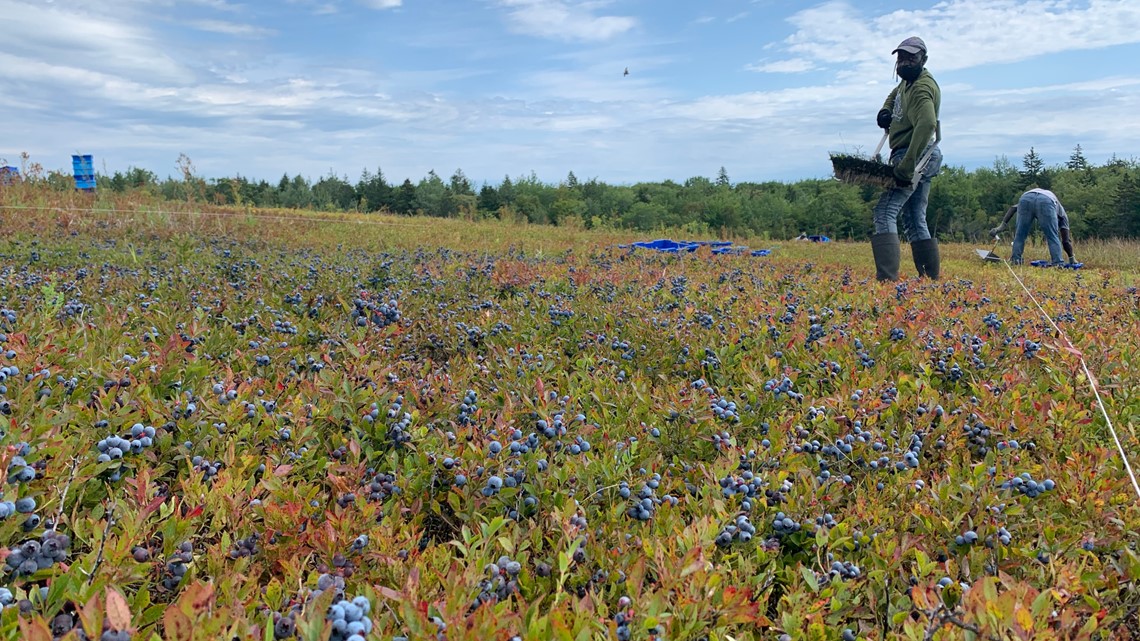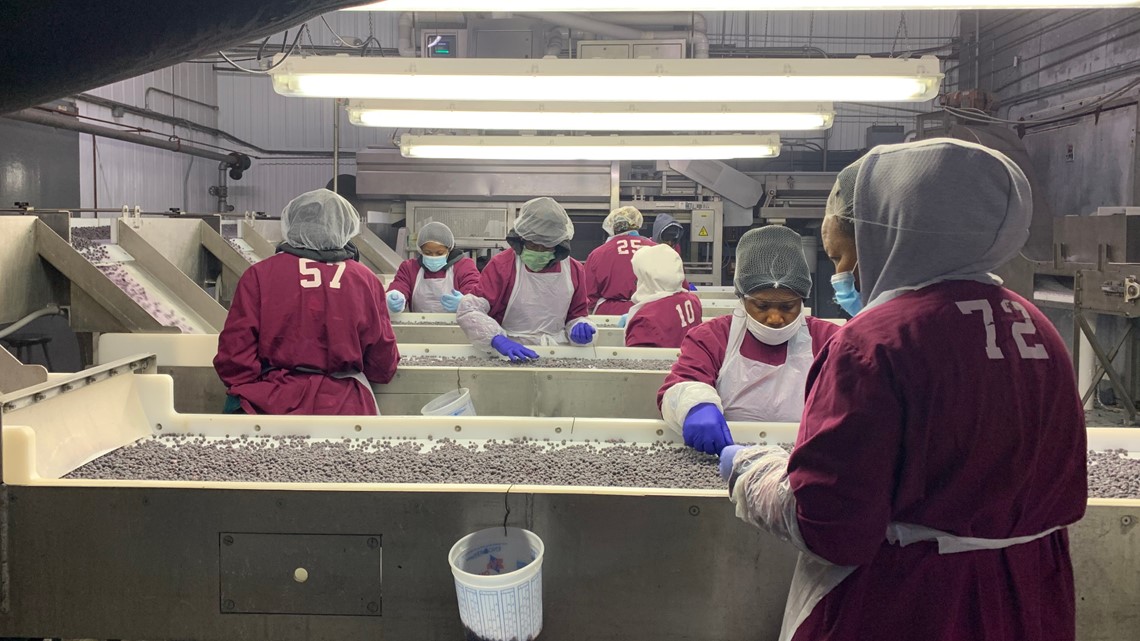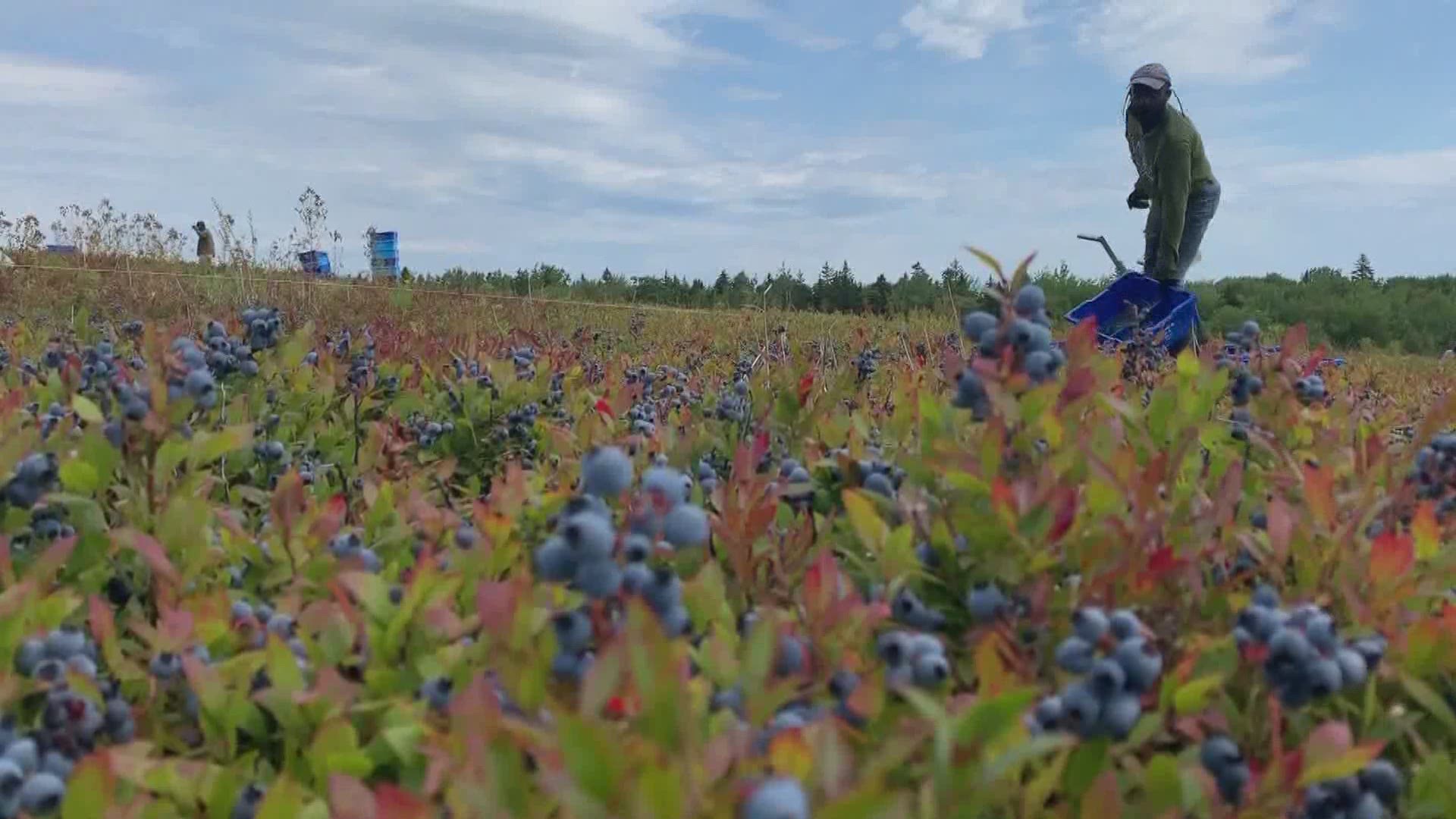MAINE, Maine — We are at the peak of the wild blueberry season. This is the month to buy fresh wild blueberries, and lots more will be frozen for people to enjoy them all year long.
There are 485 wild blueberry growers in Maine. This has been a tough year for the wild blueberry industry.
"Mother nature is usually what tells us how our year is going to be, but this year we had another problem dealing with the coronavirus," says Simeon Allen, the general manager at W.R. Allen in Orland.


This year, growers are facing challenges including a late spring frost in some parts of the state, severe droughts these past few months, and issues that come with the ongoing coronavirus pandemic, like a shortage of migrant workers.
The process starts in the fields. Migrant seasonal workers at W.R. Allen harvesting blueberries are paid by the box.
Eric Venturini is the executive director of the Wild Blueberry Commission of Maine. Venturini says wild blueberry farmers are working 14 hour days to get that crop in and get it into freezers or into pints for sale.
"Down on the coast where we have the majority of our fields we did end up having a decent crop, but 15 miles away up in Orland we had at best 50% crop that they all dried up and the drought really affected them," says Allen.
Blueberries depend on rain to size up.
"Lack of water really cuts down on the overall crop size," says Venturini.
"We've had just a little over an inch of rain, but down in the coast we've had about 3 inches of rain," says Allen.
Another issue some wild blueberry farms in Maine also had late this spring? Frost. Freezing temperatures can kill a percentage of the blossoms.
"Some fields were hit very hard by the frosts," says Venturini.
Despite the challenges, the harvest is still happening and many wild blueberry farms in the state have a great crop.
"We had fields in this area that two years ago had 60 thousand pounds, and this year had eight thousand pounds. We got a dramatic drought up here that basically we lost our fruit, it got so small and shriveled that it was unbreakable and it was not good," says Allen.
Even though wild blueberries might seem a little smaller this year, Venturini tells NEWS CENTER Maine its a berry packed with as much sweetness and antioxidants as always.
"August fresh, and always frozen," says Venturini.
Another challenge, the COVID-19 pandemic.
"It was difficult to start planning how we were going to deal with that, and with the social distancing the potential of outbreaks," says Allen.
It's an industry that heavily relies on migrant workers to rake, clean, process, and box the berries.
"Without the migrant workers, unfortunately, we will not be processing our berries and there is going to be a lot of fruit that will not get harvested and processed," says Allen.
W.R Allen has a total of 45 migrant workers. Before starting work, they got a COVID-19 test, and all tested negative for COVID-19. Everyone at the plant is following strict CDC guidelines to keep place coronavirus free.
W.R. Allen worked with the Department of Agriculture, the Wild Blueberry Commission of Maine and the Maine Mobile Health program to get everything ready before migrant workers arrived in Maine, including having COVID-19 tests available on-site to test each worker upon arrival.
Venturini added this year there are fewer migrant workers in Maine. More than 500 and less than 1,000 seasonal migrant workers harvesting and cleaning wild blueberries throughout the state.
Due to COVID-19, workers at the processing plant are following all the CDC guidelines to keep the working environment virus free.


W.R. Allen will harvest almost 600 acres of wild blueberries this year, they tell NEWS CENTER Maine back in the day it was more than 1000 acres.
"We are going to be down 20 percent of what we expected. We expected to have a very good crop, and all in all, I think we will still have a good crop, but we did definitely lose some acreage to that drought up here in this area," says Allen.
"I think that every Mainer should have a relationship with a wild blueberry farmer, and every Mainer should always have a box of wild blueberries in their freezer all year long!" says Venturini.
"All in all I wouldn't call it a bust, I wouldn't call it a great year. For us, we are going to have a good to average year, says Allen.
Venturini tells NEWS CENTER Maine the commission's concern is that a lot of the federal coronavirus support for agriculture comes through the coronavirus food assistance program, and the wild blueberry industry has not seen a benefit from that.
"The biggest challenge with labor is trying to get locals, getting Mainers to work as well," says Venturini.
You can stop any time by W.R. Allen and get your box of frozen blueberries.
You can also call them at (207) 469-2307 or email them at wralleninc@gmail.com

